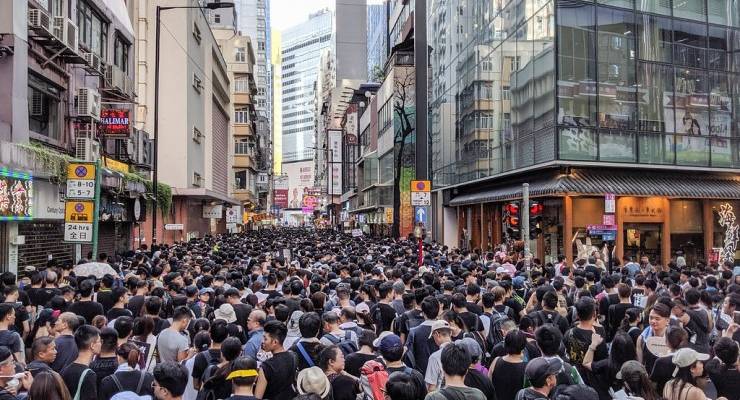
Despite the protests that have raged on Hong Kong’s streets for the past nine months, it has become clear that little will change in the city in at least the medium term.
The protests themselves have only caused problems for Hongkongers in very small pockets of the sprawling metropolis of over 7 million people. When I visited two weeks ago, none of the several dozen locals that I spoke to felt they were in any danger, bar being in the wrong place when the wind changed if tear gas had been used nearby.
Australians have a relatively large presence in Hong Kong. The Department of Foreign Affairs and Trade (DFAT) estimates that that are about 100,000 Australians living in Hong Kong. Some are native born Australians, but the biggest cohort is made up of Chinese- or Hong Kong-Australians who have returned to their home city to work. There are also about 6000 businesses in Hong Kong run by Australians, again the majority of these by Hong Kong-Australians — and the Australian Chamber of Commerce in Hong Kong is one of the biggest and most active in Asia.
Interestingly, in August the chamber issued a statement on the protests urging the withdrawal of the extradition bill that had been the catalyst for the original protests.
Hong Kong is also a major trading partner of Australia (although much of that trade is de facto trade with China, which slips in and out of the porous land and water borders between the city and the mainland). Australia and Hong Kong signed a free trade agreement in March 2019, that was ratified by parliament in November.
There were no people out of those I spoke to, who did not already have plans, that had decided to leave the city because of the protests — anecdotally there were one or two expatriate parents who were considering speeding up plans to leave the city.
While it is true that corporations in non-financial sectors, particularly technology and retail, have drifted away from Hong Kong as their Asia-Pacific headquarters in recent decades — largely to Singapore and, in the case of energy and mining, to Kuala Lumpur — the beating heart of Hong Kong’s economy, the financial services, and the legal and consulting service industry that hang off it, are staying put.
As Crikey has noted before, more than 60% of capital and inflows and outflows to and from the mainland are phased through the ever spinning “money laundry” that is Hong Kong’s money, bond and share markets.
Banking and finance industry executives who spoke to Crikey in Hong Kong all expressed confidence that the unrest has and would change nothing in the way the system operates, but noted that there had been a longer-term trend to outsource non-core financial services jobs to jurisdictions outside Hong Kong and China (for both cost and security reasons), with India being the most popular destination.
They also noted, as did other business people, that employment trends in the city had moved away from expatriates from Western countries towards returning Hongkongers, Taiwanese people and Singaporeans, as well as overseas-educated mainland Chinese people who all possessed the jackpot of fluent English and Mandarin language skills
Hong Kong’s position is arguably that of the most important finance centre in Asia (while not as big as Tokyo or Shanghai) due to its central role in the Chinese economy. It is underpinned by its legal system, which is, like Australia’s, based on the English Common Law — and Australia has long played a role here.
“As Hong Kong is Australia’s most popular business base in north-east Asia, we have a substantial stake in the integrity of Hong Kong’s legal system,” the Department of Foreign Affairs website said.








“…Some are native born Australians, but the biggest cohort is made up of Chinese- or Hong Kong-Australians who have returned to their home city to work. …” and so the class/tiered system of citizenship is now being reinforced by Crikey! Who would have thought we would see this day. Here’s me thinking once your an Australian that’s what you are. But no, there’s a thing call ‘native born’ – have we asked indigenous Australia about using that line?
It is very difficult to “second-guess” the eventual result. One possibility is that Xi will move
Lam and make a commitment to the 1997 agreement. On the other hand, having goaded the
protesters into increasing degrees of violence and damage a rerun of 1989 is not out of the question.
The objective for the PRC is for Shenzhen (20kms away) to become bigger and brighter than HK. Some
Cantonese (old HK) merchants perceived this trend 30 months or so ago. These guys could be the
source of the money for the protesters whom Michael FAILED to mention are very well provided for.
Nothing is occurring in isolation except that the original justification for the protests has long
passed. Trump could have abstained from signing the recent Bill into law but he did so nevertheless.
Such an event needs to be considered along with the Trade stuff that is occurring.
Tourism is at fractional levels even for Xmas. Five star hotels are as cheap as chips. Retailers
are not attaining the revenues they once were and hours (e.g. WingOn etc.) and staff have been
reduced. Sloppy observations Michael : you missed this stuff or didn’t have sufficient knowledge
to make a compression.
As to “banking and finance” the ANZ bailed about Sept. 2017 (sold to a Singapore mob) and corporate finance has very much declined. However, not a bad try in any event.